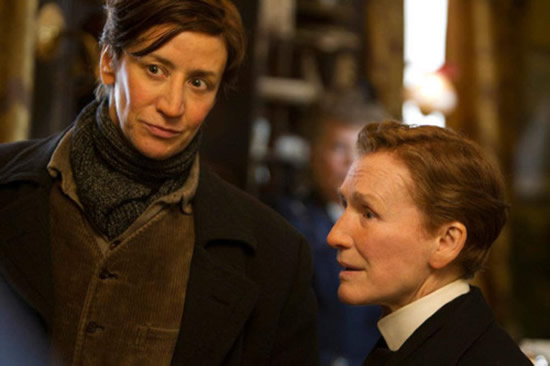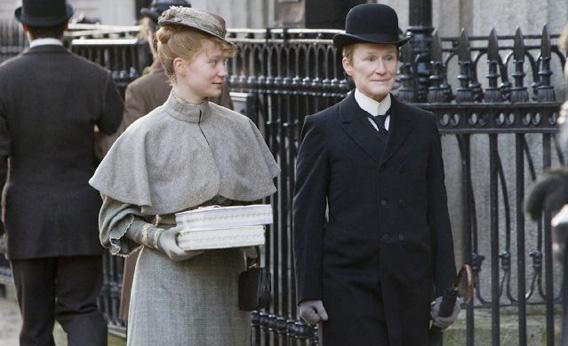 |
| Mia Wasikowska and Glenn Close in ‘Albert Nobbs’ |
Haunting and sad, Albert Nobbs tells the tale of a woman who disguises herself as a man in order to survive in 19th Century Ireland. A “labor of love” and a “dream fulfilled,” Oscar nominee Glenn Close, who co-wrote the screenplay, tried to get Albert Nobbs made into a film for 30 years. Adapted from the play, which Close starred in on Broadway in 1982, is itself adapted from George Moore’s short story. Moore’s books were controversial “because of his willingness to tackle such issues as prostitution, extramarital sex and lesbianism.” Rodrigo Garcia’s poignant film Nine Lives, which Close also appeared in, showcasing 9 vignettes of women’s lives, is one of my favorite films. So my expectations were high for Albert Nobbs.
Was this a “jaw-dropping performance” by Glenn Close? She was absolutely outstanding. I didn’t realize at first just how good of a job she did until I realized I completely forgot that it was Glenn Close! I’m used to seeing her play strong, confident or assertive women. Here, Close plays a character shy, awkward, guarded and desperately lonely. She melts into the role. She’s as straight-laced and tightly wound as the prim and proper world around her.
“Albert was particularly tricky because there’s always the question of how much should show on her face because a lot of it is somebody who’s totally shut down, who doesn’t even look people in the eye. Servants weren’t supposed to look people in the eye, but she’s an invisible person in an invisible job. And then her whole evolution is slowly being able to look up – the first time she really looks someone in the face is after she’s told Hubert her story and then she kind of looks out to her dream.”
 |
| Janet McTeer and Glenn Close |
“I tried to be, on the one hand, very male, by which I mean large and expansive and confident and sitting on the back of the heels, as it were, and on the other hand I wanted [my character] Hubert to have as many as what we consider to be the loveliest of the female qualities — empathy, compassion, kindness. I wanted Hubert to be a really good mixture of both.”
After Albert meets Hubert, she realizes she could have a life of companionship. SPOILER -> Hubert is married to a woman she adores and a beautiful scene between the two portray a tender, loving and devoted couple. <- END SPOILER Hubert gives Albert hope for a different future: a life free from the shackles and confines of loneliness. In a bittersweet scene, Hubert and Albert walk along the beach together. Albert in a dress, the first she’s worn in 30 years, runs along the beach. Reminded of her old identity, in a rare expression of emotion, she’s unconstricted, buoyed by freedom and sheer joy.
Many movies contain cross-dressing plotlines for comedic effect. But not a lot exist that focus on gender-bending from a dramatic angle. Boys Don’t Cry and Transamerica explore the lives of a trans man and woman while Yentl and The Ballad of Little Jo both echo Albert Nobbs as they feature women who choose to live as men in order to survive or pursue their dreams. An act of violence as a young girl catalyzes Albert to live as a man to protect herself and survive.
Critics have focused on the gender components. But class, an equally important theme, threads throughout the entire film. Albert Nobbs depicts how women contended with and endured poverty. We witness the stark dichotomy between the lavishly wealthy clients and the servile wait staff in the hotel. Servants in the Victorian Era were to be invisible, never looking the upper class in the eye. With her downcast eyes, Albert remains dutiful. Yet she begins to aspire for more. Albert has been saving her money all her life and hopes to open a shop of her own.
The film portrays relationships and courtship as an economic contract. When Albert courts the coquettish Helen (Wasikowska), Helen expects and asks for all sorts of gifts and trinkets. SPOILER -> We also see class play out after Helen gets pregnant. Women needed men in order to survive financially. Women who give birth to children out of wedlock were punished fiscally, fired from their jobs. Husbands provided fiscal security. <- END SPOILER Gender and class coalesce. You realize Helen’s gender and station in life condemn her situation. Albert and Hubert would never be able to attain their dreams (and Hubert her independence) had they retained their identity as women.
I perpetually worry audiences watch period films with dangerously confining gender roles and then sit back thinking, “Phew, we’ve come so far!” Yeah, no, we so haven’t. Albert Nobbs raises so many thought-provoking questions. Why is the male gender the more “desirable” gender in society? What does it say about a society where half its population has a mere two options for their lives? How can women take charge of their own lives amidst confining gender norms? But therein lies my problem with the film. It provides no conclusions, the answers remain elusive.
The tragic story of Albert Nobbs lingered in my memory long after I left the theatre. Its exploration of female friendship, lesbian love, class and poverty, gender roles and a woman’s self-discovery, truly make it a rare gem.

SPOILERS IN THIS COMMENT!
The thing that intrigues me about this movie, which by the way I really like, is the ambiguity. Does Albert think of zirself as a man or a woman? Is ze a lesbian, a straight man, asexual, a heterosexual woman who has to pretend to prefer women? Ze doesn’t seem to want to pursue a traditionally sexual/romantic relationship with Helen; ze seems to see her as more of a necessary prop to zir dream life as a shop owner. Ze also views zir masculine presentation as “disguising” or “hiding”, which seems to me to imply that ze has no feeling of gender ambiguity.
(I also noticed that in your review you use feminine pronouns, which I infer as meaning that your view of Albert is a disguised woman rather than a trans man. Is that correct? As for me, I’m using gender neutral pronouns simply because I’m focusing on the film’s gender and sexual ambiguity in this comment.)
Hubert is an equally interesting although entirely different case. Once again, does ze think of himself as a man or a woman? Ze has a loving relationship with a woman and is far more self-accepting, but what self is ze accepting? I also wonder whether zir wife sees herself as being married to a man or a woman.
The beach scene is very revealing. When Albert allows zirself to wear a dress and run on the beach, it appears that ze wishes to return to presenting as a woman. On the other hand, Hubert appears far more uncomfortable with this experiment and looks like ze desperately wants to go put on a pair of trousers. LOL
I think it’s unrealistic to imagine that someone born and bred into a Victorian mindset could have a fully conscious sense of non-binary gender or sexuality. And that, I guess, is the crux of the problem.